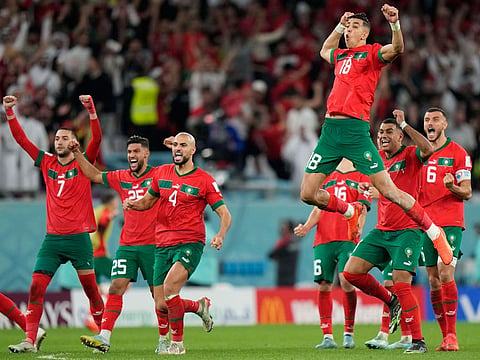How Qatar World Cup rekindled the Arab spirit
The shelf life of a vision we once called the “Arab nation” has not expired

The World Cup, a universally beloved global event where fans from around the world cheer on their national teams, all the while anchoring in these teams’ triumphs a measure of their national self, is now and for the first time in its quadrennial 92-year history being held in the Arab world.
But this World Cup has generated more than the well-deserved pride Arabs have felt in the performance of their own teams on the playing fields. It has, as if almost mystically, awakened something long dormant in the collective national consciousness of the Arab peoples — a kinship of vision about their sense of shared peoplehood, one that throughout the first and well into the second half of the 20th century had had a mastering grip on their national sensibility and self-definitions.
And that vision propelled what we went on to call pan-Arabism, a movement that saw the Arab peoples, who inhabited countries in the Middle East and North Africa stretching from the Euphrates to the Nile and from the Atlantic to the Gulf, as one nation. Then we called it the “Arab nation”. Today we might call it the “Arab Union”.
For the peoples of the Arab world at the time it was as compelling a mythology of hope as Marxism had been to the peoples of the European world, but while Marxism began to lose its appeal to Europeans long before the collapse of the Soviet Union — the standard bearer and self-styled custodian of the ideology — pan-Arabism remained alive as a defining ethos of the Arab street, even at those junctures in modern Arab history when its realisation appeared mockingly remote.
One Arab nation
Arabs may not have gone on to live in one Arab nation, but they continued to share unshakeable affinities derived from their historical archetype, affinities that transcended the borders imposed on them by a trick of fate or by the trick of a former colonial overlord.
Here, look, there’s an Arab from Agadir, on the shore of the Atlantic Ocean, who shares the same language, the same faith, the same history, the same literature, the same culture, not to mention the same conjectures on national meaning, with an Arab living in Gaza, on the eastern edge of the Mediterranean, with another Arab living on the left bank of the Euphrates River and with yet another Arab living along the Gulf of the Arabian Peninsula — among other people in other places where Arabs live in their world.
And look, here’s why Arabs watching the World Cup from their stadiums in Qatar let out ear-piercing chants and boisterous cheers, while other Arabs watching it on their television screens sang and danced through the night, taking to the streets in countless villages, towns and cities across the Arab world, when Saudi Arabia won against Argentina and Morocco, beginning a week later, went on to win against Belgium, Spain and, in a nail-biting, heart-stopping game, Portugal.
After that string of dazzling victories, the image Arabs carry of themselves has acquired a new straightness of back.
But beyond the sportsmanship, there’s that fraternal bonding evinced, ever so spontaneously, ever effortlessly, ever so genuinely, by the peoples of the Arab world for each other.
Commenting on the symbolism of that bonding, Professor Mira al-Husseini, an Emirati sociology researcher at Oxford University, told Time magazine simply but succinctly, “What they did really was just show how unanimous the Arab street is”.
We are all Arabs
The shelf life of that vision we once called the “Arab nation” has not expired. We remain, as the celebrated Medieval geographer al Maqdissi, who journeyed extensively in the Arab world, called us, “peoples of the letter da’ad”, that one letter in the Arabic alphabet whose pronunciation is unique to our language. (Shams al-din al-Maqdissi, born in 946 in Jerusalem, whose name he bears — al-Quds, Jerusalem, al-Maqdissi, Jerusalemite — was one of the earliest historical figures to identify himself as a Palestinian during his travels.)
And for my generation of Arabs, old geezers one and all, watching Arabs across the Arab world, hugging each other, sharing their communal sense of national reference together and, as it were, giving valentines to one another, it was at once a heart-warming experience and an affirmation of that vision we had embraced as youngsters, the one attesting to the fact that the Arab people, the Arab nation, the Arab world, well, yes, they rock, baby.
Fawaz Turki is a journalist, academic and author based in Washington. He is the author of The Disinherited: Journal of a Palestinian Exile.
Sign up for the Daily Briefing
Get the latest news and updates straight to your inbox



